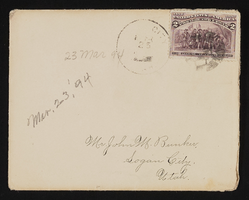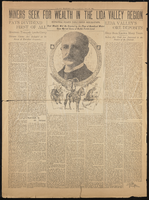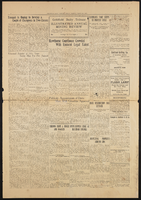Search the Special Collections and Archives Portal
Search Results

Letter and envelope from Mary Etta Syphus, Provo, Utah to John M. Bunker, Logan Utah
Date
Archival Collection
Description
From the Syphus-Bunker Papers (MS-00169). The folder contains an original handwritten letter, an envelope, a typed transcription of the same letter, and a copy of original letter attached.
Text
Edith Giles Barcus Family Papers
Identifier
Abstract
The Edith Giles Barcus Family Papers document the lives and work of three related individuals who lived in Goldfield, Nevada: noted mining engineer Edwin S. Giles who settled in Goldfield in 1907, his daughter Edith Giles who was raised in Goldfield, and Clyde Barcus, also a mining engineer, who came to Goldfield in 1923 and married Edith Giles soon thereafter. The papers date from 1848 to 1979 and document the business and personal lives of two generations of the Giles-Barcus family in Goldfield and Las Vegas, Nevada. The collection includes: property, commercial, financial, and mining records; mining and engineering reports; notes on minerals; correspondence; and photographs of the family, Goldfield, and travel shots of the western United States.
Archival Collection
Larry Ruvo oral history interview
Identifier
Abstract
Oral history interview with Larry Ruvo conducted by David G. Schwartz on January 27, 2009 for the Remembering Jay Sarno Oral History Project. Ruvo begins by discussing his position as a front desk clerk at Caesar’s Palace in Las Vegas, Nevada in the 1970s. Ruvo then describes how Jay Sarno changed the casino industry by designing Caesar’s Palace with a single theme. Ruvo then chronicles how gaming gradually was legalized in more areas throughout the world and how Sarno capitalized on making Caesar’s Palace an iconic casino which made people want to travel to Las Vegas. Lastly, Ruvo discusses Sarno’s focus on offering both gaming and entertainment options for guests at Caesar's Palace.
Archival Collection
Celesta Lowe oral history interview
Identifier
Abstract
Oral history interview with Celesta Lowe conducted by Patrick Carlton on February 6, 2002 for the Las Vegas Rotary Club Oral History Project. Lowe begins by discussing her early life in Baker, California and her father’s role as a station agent for the Tonopah Tidewater Railroad during the 1920s and 1930s. Lowe then describes her family moving to Las Vegas, Nevada in the 1940s. Lowe chronicles the process state legislatures took to open Nevada Southern University in 1957 and her role as an administrative assistant in the main office of the school. Lowe recounts her career at Nevada Southern University, the expansion of the campus, and renaming it University of Nevada, Las Vegas. Lastly, Lowe talks about her switch from an administrative assistant to a librarian at UNLV.
Archival Collection
Roger D. Foley Papers on United States v. Cappaert
Identifier
Abstract
The Roger D. Foley Papers on United States v. Cappaert are comprised of materials collected by District Judge Roger D. Foley while performing his duties as judge in
Archival Collection
Kane Springs Ranch Records
Identifier
Abstract
The Kane Springs Ranch Records (1930-2005) contain materials related to the Kane Springs Ranch in Meadow Valley Wash outside of Moapa, Nevada. The collection primarily focuses on the property itself, but also contains a genealogy of the Huntsman family, the ranch's first owners. Records include deeds and materials from the sale of the Kane Springs Ranch to the Bureau of Land Management in 2005. The bulk of the collection documents how the Bradley Stuart family used its resources from 1952 to 2003. These materials are related to water usage on the property and a rock and sand mining operation.
Archival Collection
John Ponticello Papers
Identifier
Abstract
The John Ponticello Papers are comprised of materials related to Ponticello's experiences in Las Vegas, Nevada between 1956 and 1971 with an emphasis on his Research Gambling Game Project, which he conducted and published between 1968 and 1971. The collection includes materials regarding gaming licenses and applications, research agreements, descriptions of the project, and publications about the research project. Also included are materials from Ponticello's experiences in Las Vegas such as business cards, county work cards, and souvenir photographs.
Archival Collection

Meeting minutes for Consolidated Student Senate University of Nevada, Las Vegas, November 17, 1993
Date
Archival Collection
Description
Text


